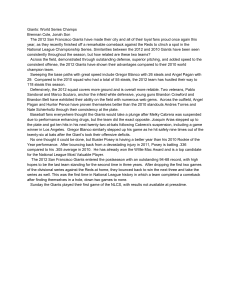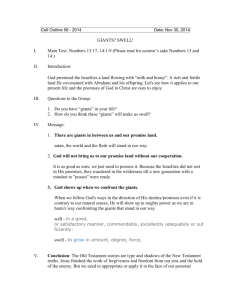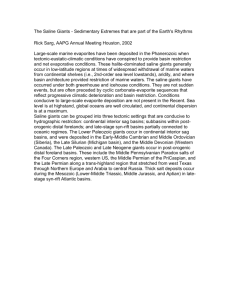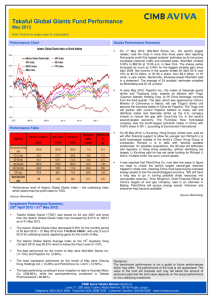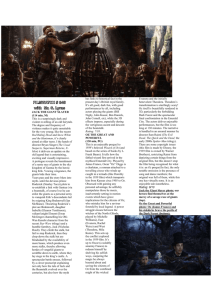Epi4b2012 - Grace Church in New York City
advertisement
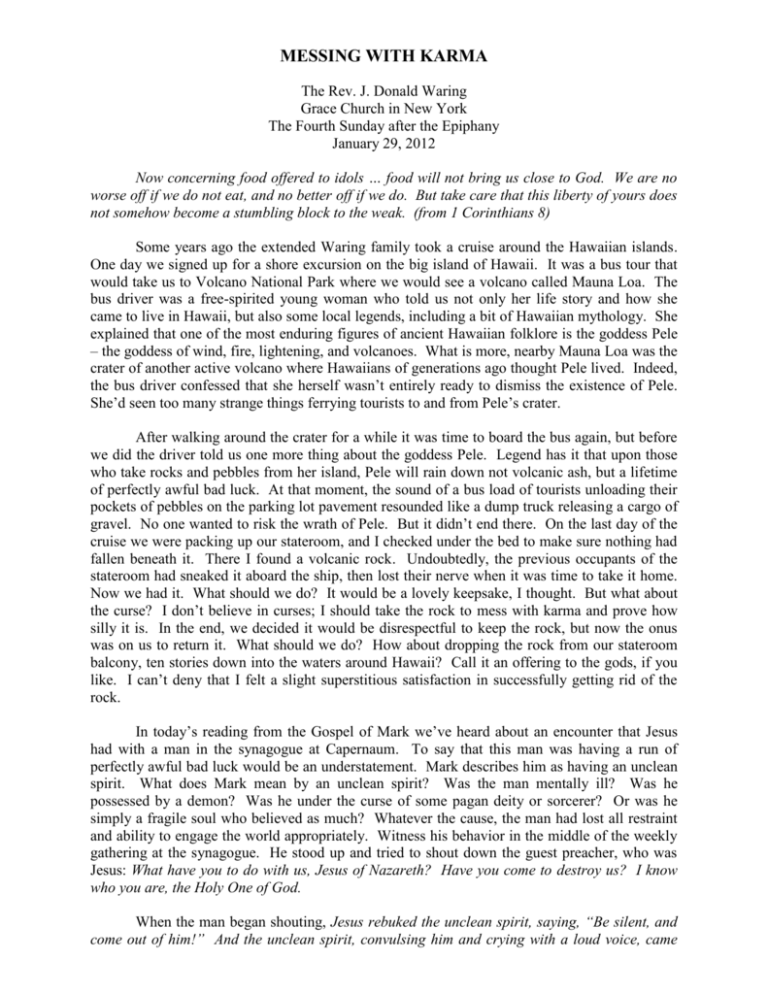
MESSING WITH KARMA The Rev. J. Donald Waring Grace Church in New York The Fourth Sunday after the Epiphany January 29, 2012 Now concerning food offered to idols … food will not bring us close to God. We are no worse off if we do not eat, and no better off if we do. But take care that this liberty of yours does not somehow become a stumbling block to the weak. (from 1 Corinthians 8) Some years ago the extended Waring family took a cruise around the Hawaiian islands. One day we signed up for a shore excursion on the big island of Hawaii. It was a bus tour that would take us to Volcano National Park where we would see a volcano called Mauna Loa. The bus driver was a free-spirited young woman who told us not only her life story and how she came to live in Hawaii, but also some local legends, including a bit of Hawaiian mythology. She explained that one of the most enduring figures of ancient Hawaiian folklore is the goddess Pele – the goddess of wind, fire, lightening, and volcanoes. What is more, nearby Mauna Loa was the crater of another active volcano where Hawaiians of generations ago thought Pele lived. Indeed, the bus driver confessed that she herself wasn’t entirely ready to dismiss the existence of Pele. She’d seen too many strange things ferrying tourists to and from Pele’s crater. After walking around the crater for a while it was time to board the bus again, but before we did the driver told us one more thing about the goddess Pele. Legend has it that upon those who take rocks and pebbles from her island, Pele will rain down not volcanic ash, but a lifetime of perfectly awful bad luck. At that moment, the sound of a bus load of tourists unloading their pockets of pebbles on the parking lot pavement resounded like a dump truck releasing a cargo of gravel. No one wanted to risk the wrath of Pele. But it didn’t end there. On the last day of the cruise we were packing up our stateroom, and I checked under the bed to make sure nothing had fallen beneath it. There I found a volcanic rock. Undoubtedly, the previous occupants of the stateroom had sneaked it aboard the ship, then lost their nerve when it was time to take it home. Now we had it. What should we do? It would be a lovely keepsake, I thought. But what about the curse? I don’t believe in curses; I should take the rock to mess with karma and prove how silly it is. In the end, we decided it would be disrespectful to keep the rock, but now the onus was on us to return it. What should we do? How about dropping the rock from our stateroom balcony, ten stories down into the waters around Hawaii? Call it an offering to the gods, if you like. I can’t deny that I felt a slight superstitious satisfaction in successfully getting rid of the rock. In today’s reading from the Gospel of Mark we’ve heard about an encounter that Jesus had with a man in the synagogue at Capernaum. To say that this man was having a run of perfectly awful bad luck would be an understatement. Mark describes him as having an unclean spirit. What does Mark mean by an unclean spirit? Was the man mentally ill? Was he possessed by a demon? Was he under the curse of some pagan deity or sorcerer? Or was he simply a fragile soul who believed as much? Whatever the cause, the man had lost all restraint and ability to engage the world appropriately. Witness his behavior in the middle of the weekly gathering at the synagogue. He stood up and tried to shout down the guest preacher, who was Jesus: What have you to do with us, Jesus of Nazareth? Have you come to destroy us? I know who you are, the Holy One of God. When the man began shouting, Jesus rebuked the unclean spirit, saying, “Be silent, and come out of him!” And the unclean spirit, convulsing him and crying with a loud voice, came out of him. The people were astonished. Note well: the people were not astonished or even startled by the disruption. They must have known the man and expected his outbursts. The only thing that surprised them this time was that someone was finally able to do something about it. The people were amazed at the authority of Jesus, who was able to heal and restore the man with the force of his word. What Mark the gospel writer wants us to take away from the scene is to see and know the authority of Jesus. The incident in the Capernaum synagogue dramatizes what the Apostle Paul would later write, that at the name of Jesus every knee should bow, in heaven and on earth and under the earth, and every tongue confess that Jesus Christ is Lord, to the glory of God the Father (Philippians 2:10-11). For those who belong to Jesus and put their whole trust in him, this means that no power is able to claim them. No pagan god, no sorcerer’s curse, no superstition, neither death, nor life, nor angels, nor principalities, nor things present, nor things to come, nor height, nor depth is able to separate them from the love of God in Christ Jesus our Lord. If you claim the faith of Jesus and trust in him you are free – free to walk under ladders, free to live on the 13th floor of your building, free to spill salt, break mirrors, and step on the cracks of sidewalks. You are free to mess with karma. Christ has set us free. What you are not free to do, however, is take rocks from a national park on the big island of Hawaii. To do so is against the law. Indeed, the most reliable sources as to the origin of Pele’s curse maintain that it was invented by a park ranger to scare people into obedience. Even still, people who have taken rocks live in terror, and blame every little thing that goes wrong on Pele’s curse. At least one Hawaiian resort is willing to traffic in their fear. If you mail them your rock along with $15 they promise to wrap it in a good luck ti leaf, and offer it back to Pele along with an orchid and prayers for her forgiveness. In this way, the unclean spirit will be cast out, and your good luck restored. You can read all this on the internet, including the heartfelt apologies to Pele. Can you imagine? We can shake our heads in wonder, but what about the magical thinking and superstitions that sometime get a grip on us? I was amused by an article in the New York Times this week about Peyton and Eli Manning, the two brothers who are both superstar quarterbacks in the NFL: Peyton with the Colts and Eli with the Giants. Unless the Colts happen to be playing against the Giants, the Manning brothers root for each other. This year Peyton was sidelined with an injury for the whole season, and the Colts had a terrible time of it. But as for the Giants, you might possibly have heard in the news that they are going to the Super Bowl. Earlier this month, when the Giants won their first playoff game against the Falcons, Peyton watched on a TV in the weight room of the Colts training facility. He thought the Giants played exceptionally well. For the Giants’ next game against the Packers, Peyton thought he should watch from the exact same lucky place. This he did, and the Giants won. For the game last week against the 49ers, Peyton didn’t know what to do. He wanted to go to San Francisco and see the game, but he didn’t want “mess with karma” and leave his lucky place. I know how he feels. I’ve been a NY Giants fan my whole life. Earlier this season the Giants were having a perfectly awful run of bad luck and lost four games in a row. I got so mad that I declared I was done. Every time I watched they lost, so I would not watch anymore. The next week – December 11th – I stuck to my vow, did not watch, and the Giants beat the Cowboys. On December 18th, thinking the Giants were back to their winning ways, I watched them play the lowly Redskins. Guess what? They mysteriously lost a game everyone thought they should have won. On December 24th, because I could not afford to be worked up about a football game on Christmas Eve, out of self preservation I did not watch the Giants play the Jets. The Giants won. On January 1st the Giants played the Cowboys again and I decided to test my theory and not watch. They won. Meanwhile, because the TV had been free all these Sundays, my wife Stacie had begun reviewing and enjoying as if new her vast collection of Jane Austen DVD’s. “Pride and Prejudice” alone has been filmed perhaps seventeen times (and I have been told that once Colin Firth played the role of Mr. Darcy, no further productions were necessary). In any case, by January 8th it seemed that the lucky recipe for a Giants victory was established: I could not watch, and Stacie had to have a Jane Austen DVD running. This we did on January 8th, 15th, and 22nd, each time resulting in a Giants victory. Oh, the things I do for Big Blue! Little do the Giants know that filling in any gaps in their defensive line are the five love-struck Bennet sisters in full, flowing period garb, straining to break through for the sack. Tom Brady will never see them coming, and he won’t know what hit him! Such magical thinking and superstitious scruples are nothing new. In fact, they were roiling the early Christians in Corinth, so much so that Paul the Apostle had to address it in the portion of his Epistle that we heard today. Corinth was a religiously plural society with a multitude of temples to gods and goddesses of every sort. Much of the meat offered for sale in the marketplace had been sacrificed to some deity in one temple or another. Was it allowable, was it safe for Christians to eat such meat? One group said absolutely not. Meat offered to idols was defiled; to eat it would be an offense to God. It might even be infected with evil spirits; to ingest it would be to risk taking unclean powers into yourself. You might wind up like the man in the synagogue at Capernaum. A second group said that it was perfectly harmless to eat meat that had been offered to pagan gods. The pagan gods had no existence, regardless of how fervently people feared them and ascribed power to them. It was all imaginary. With such knowledge, this second group felt free to buy in the market place and eat at any table without worrying that some sinister supernatural power might sneak into their soul through a sirloin steak. So went the argument in the church at Corinth. Paul’s counsel to the Corinthians was not a blanket rule for every occasion. In essence, he agreed theologically, but not pastorally, with the second group. They were correct in discerning the emptiness of idols. Having no existence, they have neither magical nor supernatural power. For us there is one God, the Father, from whom all things and for whom we exist, and one Lord, Jesus Christ, through whom are all things and through whom we exist. Theologically, Paul affirmed the absolute authority of Jesus over every power. But pastorally, Paul chided the second group because the free and open exercise of their liberty was causing the first group to stumble. The first group still had the old ways and customs on their conscience, and they were slow to wake from their fears. They were not entirely out of the dark. Do you know what it’s like when you are in the dark and someone turns on all the lights, all at once? You close your eyes, reject the light, and choose the dark. Such was the effect that the second group of Corinthians was having on the first. By openly and perhaps insensitively eating meat offered to idols, they were hindering, not helping other members of their church emerging into the light. Put another way, the second group was being needlessly disrespectful and rude. So Paul wrote, We are no worse off if we do not eat, and no better off if we do. But take care that this liberty of yours does not somehow become a stumbling block to the weak … Therefore, if food is a cause of my brother’s falling, I will never eat meat, lest I cause my brother to fall. Last week Peyton Manning messed with karma, flew to San Francisco to watch the NY Giants, and his brother did not fall. I hear he is planning to attend the Super Bowl next week, but as it happens, the game will be played in Indianapolis, in the Colts’ stadium, the very same building where the Colts have their training facility. If the Giants start losing, Peyton can always go down and sit on his lucky weight bench. He can have it both ways. As for me, if truth be told I too messed with karma last week, and I watched the 4th quarter and overtime of the game. The Giants won, proving that they are no worse off if I do not watch, and no better off if I do. Christ has set me free – free from fear and guilt, free from powers and principalities, free even to watch the Giants in the Super Bowl next week. I must take care that this liberty of mine does not become a stumbling block to other members of my family. Nevertheless, the Scriptures have moved me to set forth a theological and pastoral defense of why I should watch the Super Bowl. Call it an offering and a sacrifice to the Lord, if you like. I have decided to follow Jesus. No turning back. + The New York Times article about the Manning brothers appeared on Wednesday, January 25, 2012 and was written by Judy Battista.
